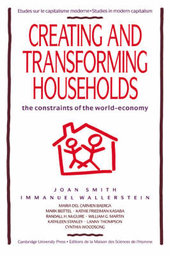
|
Creating and Transforming Households: The Constraints of the World-Economy
Paperback / softback
Main Details
| Title |
Creating and Transforming Households: The Constraints of the World-Economy
|
| Authors and Contributors |
By (author) Joan Smith
|
|
By (author) Immanuel Wallerstein
|
|
Contributions by Maria del Carmen Baerga
|
|
Contributions by Mark Beittel
|
|
Contributions by Kathie Friedman Kasaba
|
| Series | Studies in Modern Capitalism |
|---|
| Physical Properties |
| Format:Paperback / softback | | Pages:320 | | Dimensions(mm): Height 227,Width 152 |
|
| Category/Genre | Labour economics |
|---|
| ISBN/Barcode |
9780521427135
|
| Classifications | Dewey:306.3 |
|---|
| Audience | | Professional & Vocational | |
|---|
| Illustrations |
16 Tables, unspecified
|
|
Publishing Details |
| Publisher |
Cambridge University Press
|
| Imprint |
Cambridge University Press
|
| Publication Date |
27 August 1992 |
| Publication Country |
United Kingdom
|
Description
This book seeks an explanation of the pattern of sharp discrepancy of wage levels across the world-economy for work of comparable productivity. It explores how far such differences can be explained by the different structures of households as 'income-pooling units', examining three key variables: location in the core or periphery of the world-economy; periods of expansion versus periods of contraction in the world-economy; and secular transformation over time. The authors argue that both the boundaries of households and their sources of income are molded by the changing patterns of the world-economy, but are also modes of defense against its pressures. Drawing empirical data from eight local regions in three different zones - the United States, Mexico and southern Africa - this book presents a systematic and original approach to the intimate link between the micro-structures of households and the structures of the capitalist world-economy at a global level.
Reviews"This book is a useful sourcebook for those interested iin the specific regions of the world it covers. Perhaps more importantly, it provides empirical evidence to confirm that even in the United States, the classic Fordist worker has existed only during very short periods, while the economic contribution of other members of the household has always been a crucial factor in their reproduction." Belinda Leach, Canadian Review of Sociology and Anthropology
|